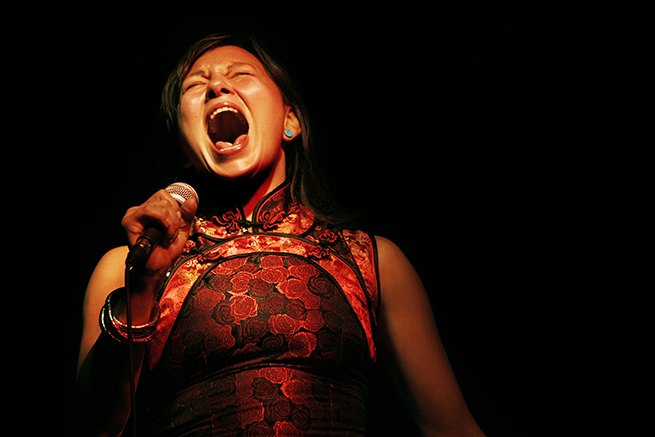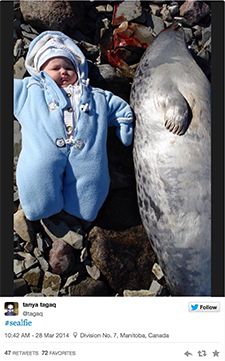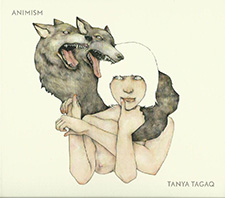
I’ve had everything from people throwing their beer bottles at me and screaming, and people angry, and people crying their faces off like really crying from right in their heart. I’ve had laughing. I’ve had boners.
Tanya Tagaq Chats with Native Waves Radio Host Janet Rogers about spirit, music food, and sex.
Janet Rogers: You’re now touring with (your album) Animism.
Tanya Tagaq: Yes, this show in particular is just with myself and Michael Red, but we will be doing a full tour in November.
JR: Tell me a little bit about your process. What it looks like to me, is someone who is completely opening their creative channels throughout their whole body. If this is actually what it’s like for you, how do you resolve being so open, after you perform?
TT: I think it’s kind of a day-to-day thing; I’m a pretty open person. I try not to carry too much. It’s a daily ritual of making sure there are no blockages and getting rid of a lot of stuff that comes naturally within myself. Getting on stage is always pretty cathartic. But the process of the abolishment of shame is a huge thing for me when it comes to the shows. I want to completely accept all the terrible parts of myself and the world and allow it to exist and allow it to happen. I figure if I can throw the worst and ugliest parts of myself it gives people permission to be themselves, and then it becomes symbiotic—that works really well for me because I leave and I feel a lot clearer.

JR: What kind of reactions have you seen from people when you perform?
TT: Everything. I’ve had everything from people throwing their beer bottles at me and screaming, and people angry, and people crying their faces off like really crying from right in their heart. I’ve had laughing. I’ve had boners. I’ve had everything I think it depends on what each individual needs to feel—they’re going to feel it. And kids are usually really open and awesome. A lot of time the parents get all, ‘oh the children shouldn’t be there for that’ but then the children themselves, most of the time, are fine.

JR: I find the Inuit legends and Inuit culture is very sexual. Is this part of who you are?
TT: Well its part of who we all are. There are lots of facets to the musicality, and what or when or why on an intellectual level—on a mind level—and then on a more spiritual level, and then on a what is level. When it comes to sexuality, I find something very, very interesting in this culture. Number one, there’s kind of a skewed thing going on regarding what women are and what sexuality is. And if you look at the history of [women’s] culture, like from foot binding to corsets to starving yourself to breast implants, there’s often been this way to edge women into not being able to move. The long nails and high heels, you can’t run in them. The removal of the physicality of the strength in order to submit—and that’s the funny thing. I instinctively know what femininity is. When I was giving birth, and when I’m having sex, and when I’m in love, it’s a very powerful thing. There’s nothing more beautiful than a woman that totally knows her body and likes to have sex and is not ashamed of it. It’s not about power or playing a game. Look at life in the igloo. It’s not supposed to be a dirty thing, or a taboo thing. It’s not about looking a certain way; it’s about being a certain way. I like giving ladies permission to be sexy in the real true sense.
JR: Who or what are you joining with to birth what you do as a singer?
TT: Well this is where things get really murky. Nothing was an intentional process. It’s something completely accidental, when I first started singing. Breaking away from this reality. When you really trust yourself and you see how someone moves and you can sense their intent. Or you smell someone and you know some part of them, like little things with instincts. And when it comes to the music I’ll sit in this kind of reality, and then it all falls away, and [creativity is] really by itself—I don’t try to make it happen, and when it doesn’t want to happen [naturally] I don’t try to make it happen. It’s about respecting what’s there. People have asked me before and I’m finally starting to understand it. When you’re sitting in nature and you’re looking at the mountain scape and you’re watching these mountains be there, and you’re really calm about it and you’re not doing anything about it that’s kinda like how it feels [to create]. I’m not making it, I’m observing it.

JR: What does a musician have to do to challenge you?
TT: Well they have to force me out of my comfort zone. My comfort zone is sound and insecurity, wondering what I look like and what I’m sounding like. And are these people gonna care. It’s forcing me to go, “Here’s a whole other place,” and that’s why I like playing with men. Bringing that male energy into the scope of things. Michael and Jesse and Jean Martin are all very masculine and very respectful to women and very good natured and so powerful—but really calm about it. They don’t need to claim their power by dominating. They’re not afraid of me. That is so sexy not to be afraid. Right?
JR: In terms of food, how important is food to what you do as a performer?
 TT: The food is absolutely important. It’s one of the main aspects of the performance. You can’t go on with an empty battery. What I’m doing is so physical. Traditional throat songs are 2 to 5 minutes for a reason. If I’m not well fueled I won’t be able to release my body because I’ll be distracted by what my body wants. If you’re going to elevate you can’t be worried about what your body wants.
TT: The food is absolutely important. It’s one of the main aspects of the performance. You can’t go on with an empty battery. What I’m doing is so physical. Traditional throat songs are 2 to 5 minutes for a reason. If I’m not well fueled I won’t be able to release my body because I’ll be distracted by what my body wants. If you’re going to elevate you can’t be worried about what your body wants.
[Regarding] The Seal-fie Movement. People don’t understand why I posted this picture of my baby next to a seal, it’s because most people who eat meat will see an animal carcass lying on the ground and say “EWWWWW!” I think that’s so funny. In one bite you’re eating a piece of its muscle, but you’re disgusted by the rest of it. We’re all meat. We’re all from that same thing. When a thing gives its life for you, you have to be able to be thankful. If that animal is sick or miserable you’re eating that too. It’s really embarrassing that humanity has reduced itself to this technological idiocy.

JR: People who are familiar with your tracks on the Animism album: are you able to replicate what you recorded in a live performance? If somebody shouted from the audience, “Hey! Do Fracking, do Uja!” Are you able to perform those songs [as recorded] or is everything you do live a unique event?
TT: Technically we can and we will. In November we’re going to be performing songs from the album, but the live show is about going to a place of technical chaos. Going to a place where you don’t know what’s going to happen next and therefore there’s a freedom. That’s part of it all right. But of course we’ll be able to do the songs because they’re so fun. And there’s so much to say about the album, like every song has its own meaning. In every concert I do Fracking for a bit. Anyone who hears the songs will recognize it in the live show anyway. I always kind of sung it. But I was really thinking about what it would feel like if someone was doing that to you (fracking), and that must be what it feels like, and it is terrible. I like addressing those parts of people and those parts of life because life isn’t supposed to be easy. You can try to make it easy, but you’re only fooling yourself. I don’t know why we’re raised to think everything is supposed to be okay. It’s such bullshit. We should be preparing for departure to the next reality every day of our lives. We should be teaching things and acknowledging things. It just seems like every system is totally screwed. I just want to be alive and enjoy this time while we’re here.

JR: Cliché interview question; what’s next for you?
TT: I’m going to Europe in a week. And again that’s all about food. Every single time I think about the food before I think about the concert hall or the actual show. It’s like ‘oh yay, Portugal, I’m going to have some squid.’ I love people and feeling different social climates. I love love love it so much. Because you learn a new part of yourself in every new place you go. I was always taught: you be kind, you be nice. I love Inuit ways of upbringing because, it’s like, you make the decision. You make the rules. Simple things like be kind. And I remember having to unlearn that—like you go to Shanghai, you go to New York, and if you stand there meekly waiting for everyone to get their luggage, you’ll be there forever. You gotta elbow your way in. I had to fight against myself to learn these things. And that’s why going to different cultures is so important—for me to grow or for people to grow.
 Tanya Tagaq is one of ten musicians and music acts on the Polaris Music Prize short list 2014. She will be performing at the awards gala September 22nd at Carlu in Toronto. Prior to the awards, she’s travelling abroad to perform three European dates with the film Nanook of the North before embarking on a Canadian tour with her 4th album Animism (Six Shooter Records). A U.S. tour is planned for 2015.
Tanya Tagaq is one of ten musicians and music acts on the Polaris Music Prize short list 2014. She will be performing at the awards gala September 22nd at Carlu in Toronto. Prior to the awards, she’s travelling abroad to perform three European dates with the film Nanook of the North before embarking on a Canadian tour with her 4th album Animism (Six Shooter Records). A U.S. tour is planned for 2015.
To hear the complete interview with Tanya Tagaq, listen to Native Waves Radio on Soundcloud:
Visit Tanya’s website for more tour dates and to purchase her albums:









